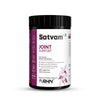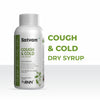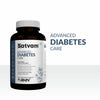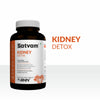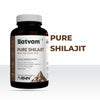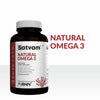Understanding Vitamin D3 Deficiency
Vitamin d3 Deficiency is a common health problem that affects millions of people worldwide. This condition primarily affects bones & muscles. A vitamin-containing diet is essential for your body’s bone development and maintenance. It is also essential for the healthy functioning of your nervous system, musculoskeletal system, & immune system.
But, insufficient vitamin D intake can lead to deficiencies, such as an impaired ability of the skin to synthesize it in the skin. Further, this article delves into symptoms & causes of deficit vitamin d3 & ways to improve it.
What Are Vitamin D3 Deficiency Symptoms?
Vitamin d3 deficiency symptoms can be subtle and easily overlooked, in some cases, may not appear for an extended period of time. Being aware of these symptoms is crucial to prevent long-term health consequences. Below we have outlined a list of common symptoms of deficit vitamin d3 to help you identify prior and take required actions.
- Feeling exhausted and fatigued
- Experiencing pain in bones, back, or muscles
- Suffering from weakness, muscle aches, or muscle cramps
- Frequent infections and illnesses
- A Feeling of depression or low mood
- Slow healing of the wound
- Experiencing severe hair loss
- Loss of weight unexpectedly
- Feeling anxious or stressed
What Are Vitamin D3 Deficiency Causes?
- Exposure to the sunlight is limited - Lack of sun exposure puts an individual at risk of vitamin D deficiency during winter months for those with limited outdoor activity or covered attire due to religion or occupation.
- Higher Body mass index - As per scientific research, an individual with a BMI over '30' often has a lower level of vitamin D. One possible explanation for this phenomenon is that vitamin D has a tendency to accumulate in fat cells. As a result, it led to lower circulation levels in an individual with higher fat cells.
- Inadequate consumption of Vitamin D - A deficiency in vitamin D can occur if you have inadequate nutrition in your diet. This is particularly problematic for individuals following a vegan diet, as natural sources of vitamin D are mostly animal-based, including fish, egg yolks, fortified milk, fish oils, and beef liver.
However, vegetarians can opt for vitamin D-rich foods such as fortified cereals, tofu, mushrooms, and plant-based milk to combat this deficiency. In addition to adequate sunlight exposure, Vitamin d3 supplements are also helpful in preventing or treating the deficiency of vitamin d3.
- Infected Kidney- Deficiencies of vitamin D result from infected kidneys since they reduce enzyme production required to convert vitamin D into its active form.
Treatment For Vitamin D3 Deficiency
The treatment for deficiencies of vitamin D involves taking supplements or eating a more vitamin D-containing diet. However, vitamin D3 deficiency is becoming increasingly common these days, and it can lead to a host of health problems such as rickets, osteomalacia, and osteoporosis. Therefore, it is crucial to take adequate amounts of vitamin D3 to maintain a healthy life.
When it comes to treating the deficiency of vitamins, taking supplements is one of the most effective ways to meet your daily requirements. But, with so many choices, it’s vital to choose a supplement derived from natural sources and of high quality. Choose a natural vitamin d3 supplements as one of the best Vitamin D Supplements to eliminate your vitamin D deficiency and optimal nutrition.
How Long Does The Deficiency Take Time To Get Recovered?
The recovery time for vitamin D3 deficiency varies from person to person and depends on the severity of the deficiency. However, as per the Indian Council of Medical Research (ICMR), Satvam's natural vitamin supplements have been shown to facilitate recovery within 30 days. To determine the best course of action for your specific needs & to monitor your progress over time, consider consulting your doctor.
Conclusion
Hence, treating vitamin D3 deficiency is vital for maintaining optimal health, whether through supplements or dietary changes. Satvam Nutrition's natural vitamin D3 supplement is a safe and effective way to fill the gap of your vitamin deficiency and support your overall health and well-being.
Also Read, The Ultimate Guide To Choose The Best Supplement For Heart Health
FAQs
- Can vitamin D3 supplements help you?
A deficiency of vitamin D3 has numerous detrimental effects on your body, but supplements provide several advantages to cure the deficiency of vitamins. Benefits such as improving bone health, boosting the immune system, reducing inflammation, and potentially lowering the risk of certain diseases.
- What is the daily intake of vitamin D3?
As per the NIH [National Institutes of Health] an average intake of vitamins is 400-800 IU or 10 to 20 micrograms. Age is a significant factor when it comes to vitamin D intake. To help you determine the correct intake, below is the following recommended intake for different age groups:
- For infants- 400 IU is equal to 10 micrograms per day.
- For teens & children- 600 IU
- For adults- 600 IU
- For the elderly- 800 IU
Several factors cause vitamin D3 levels to drop in the body, including:
- Lack of sun exposure
- Inadequate dietary intake
- Medical conditions affecting absorption or metabolism
- Obesity
- Certain medication



